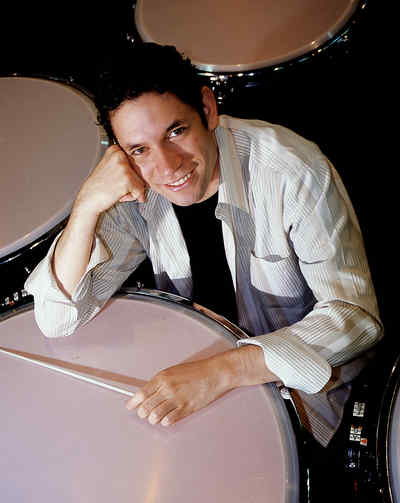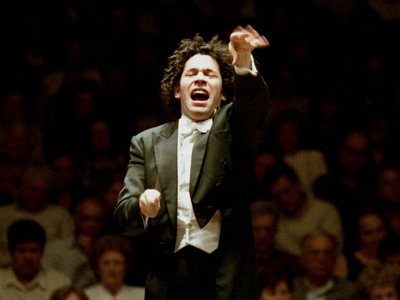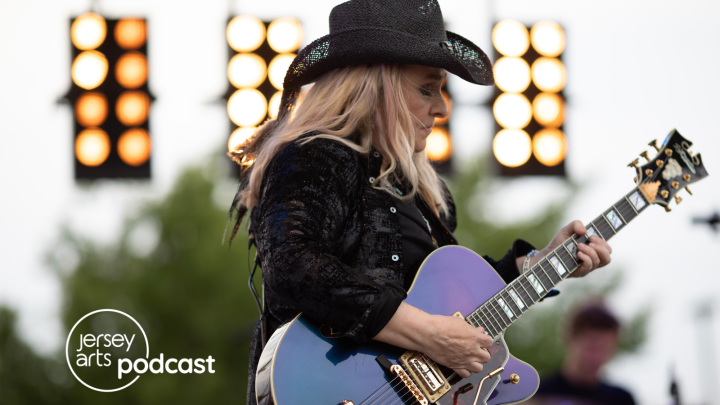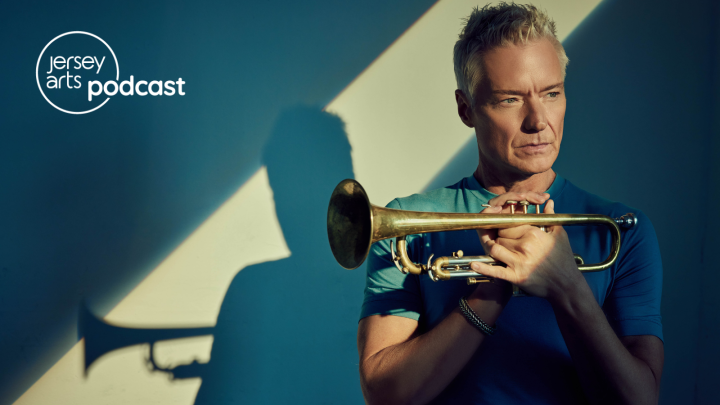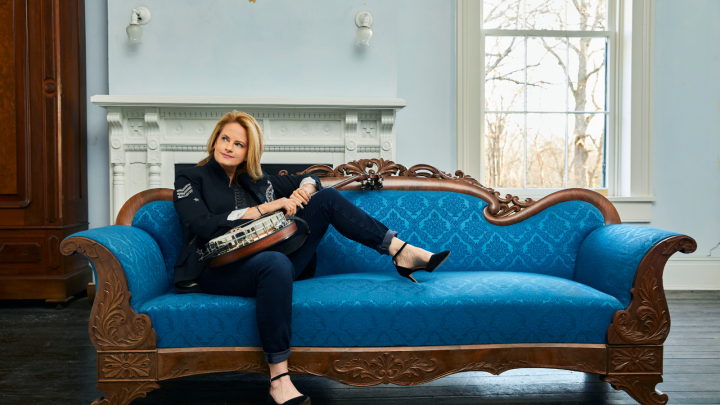Gustavo Dudamel: Classical Music and the Rebirth of the Cool.
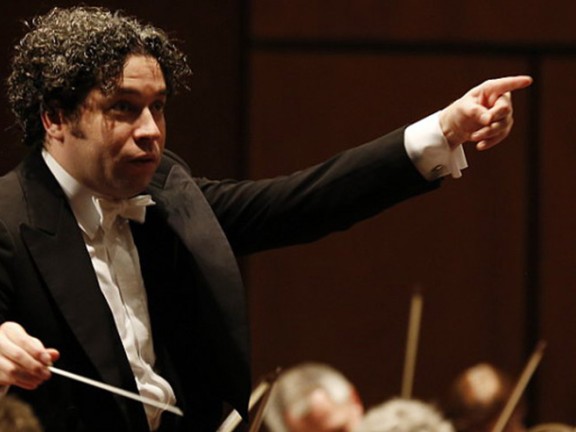
If you were waiting in the lobby of the New Jersey Performing Arts Center in Newark on Friday night, you might have been confused as to what was going on stage that night. The evening’s performers were the Los Angeles Philharmonic with pianist Jean Yves Thibaudet. But this wasn’t your stereotypical symphonic audience. Yes, there were the expected older aficionados, the dazzlingly-dressed people looking to be seen, and even a celebrity or two (former Governor Corzine smiled at me and said “good evening” as he walked by me to throw something in the trash). OK, so that already pretty much made my evening, but then I noticed something even more spectacular: a sizeable number of YOUNG people in the audience. And I don’t just mean people under 40 – I’m talking about teenagers here. Yup, at an orchestral concert.
Why were they there, you might ask? Did they take a wrong turn? Did they think they were going to the Nine Inch Nails concert that night at Madison Square Garden?
Nope. The reason they were at NJPAC Friday night was because of one man: the Philharmonic’s new conductor, Maestro Gustavo Dudamel.
Dudamel has been on the world stage for years, but since taking over the helm of the Los Angeles Philharmonic last fall, he’s become the most talked about, most written about, person in classical music today. Friday night’s concert was the penultimate concert in the orchestra’s current tour, covering the U.S., introducing Dudamel to the country.
Whatever image comes to mind when you think “conductor of a major orchestra,” discard it. Dudamel is young (he was born in 1981), charismatic, energetic and, well, cute. However, beneath the riotous mass of curls on his head, is the brain of a serious musician. On each of the tours stops around the country, the classical music writers all took turns debating whether Dudamel lived up to the hype that’s gripped LA this season (often dubbed “Duda-mania). The reviews have been a little mixed, but mostly favorable. What’s really struck me as I was tracking those reviews is the nearly constant mention of excitement in the audience.
People leaping to their feet? Cheering? Yup, that’s the kind of energy that permeated the hall on Friday and seemingly every other night of the tour. When you were in the audience that night, it seemed like something truly special was happening.
Not only is Maestro Dudamel an amazing presence on the podium, but his story is unbelievably inspiring. Dudamel was born in 1981 in Venezuela. He trained as a violinist, a product of El Sistema, Venezuela’s music education system which helps poor children. At 15(!) he was named conductor of El Sistema’s national youth orchestra, the Simón Bolívar Youth Orchestra. At 23, he won a conductor’s competition, the very prestigious Mahler Prize, which brought him onto the world stage, and provided invitations to conduct major orchestras. The Los Angeles Philharmonic offer came when he was just 26 years old. So ah…what did you accomplish by the time you were 15, or even 26?
About Dudamel, Deborah Borda, President and Chief Executive Officer of the Los Angeles Philharmonic has said, "I think that the atmosphere exists here for him to really change musical history. Gustavo has an ability to communicate what is passionate and vital about music in a very 21st century way."
What strikes me about everything I’ve read about Dudamel is the parallel to perhaps this country’s most beloved conductor of the 20th century: Leonard Bernstein. Not only a brilliant composer (West Side Story, Candide, symphonies, masses, etc), but Bernstein was also the longtime music director of the New York Philharmonic.
Did I tell you that Bernstein’s Symphony No. 2, “The Age of Anxiety,” was the first piece on the program? Was this a deliberate attempt to acknowledge the parallel between the two maestros? Perhaps. The Bernstein work was performed on every program of the tour (that’s the piece that features the gorgeous piano-work of Jean Yves Thibaudet). The second piece of my program was Mahler’s Symphony No. 1 in D Major, though that was often alternated on other programs with Tchaikovsky’s Pathetique Symphony. Choosing the Bernstein piece accomplished a number of things: showcase a great American orchestra playing the work of a great American composer, showcase a brilliant pianist, provide a nice platform for Dudamel’s passionate and energetic conducting and if one chooses to see a connection between the composer and this maestro, well…all the better. I recently read that, when Dudamel was a guest conductor for the New York Philharmonic in December of 2007, the orchestra lent him one of Bernstein’s batons. Which then broke during the performance. Perhaps that was Bernstein’s way of saying “Not so fast?”
The coolness factor at Friday’s concert didn’t stop with the maestro. The pianist, Jean Yves Thibaudet was also very cool, with his sans-tie, open-shirt, passionate piano playing. A friend of mine turned pages for him during a previous performance and her face positively glowed when I asked her how it went. She said it was amazing and that even during the blazing allegro sections, he played every single note on the page (apparently, even the most accomplished pianists sometimes let notes go by the wayside during sections like that).
At the end of the concert, one thing did surprise me: Dudamel’s modest. One would think that on this nationwide coming-out tour, with all the press focused on him, that he’d stand on the podium, basking in the enthusiastic, standing ovation cheering from the audience. But no, he spent very little time acknowledging the applause for himself. Several times, he went into the orchestra to grasp the shoulder or hand of musicians and he spent a great deal of time pointing out certain musicians for special applause from the audience: Thibaudet, the horns, the harpists and most notably, the principal violist. It was a fantastic gesture: this young man, who has had a seemingly fairytale existence, now playing to packed, cheering houses, takes extreme care to acknowledge and praise nearly every member of his orchestra, individually.
And, as if you needed another reason to love this guy, Dudamel has what I consider to be the MOST AWESOME performing arts iPhone app ever: Bravo Gustavo! It’s fun, it’s free, and it lets you (think you can) conduct the orchestra just as if you were Dudamel himself. Fantastic hair not included.

